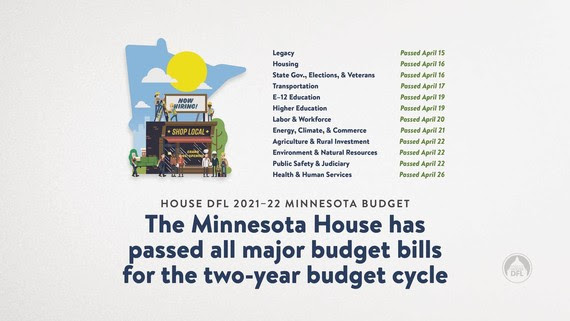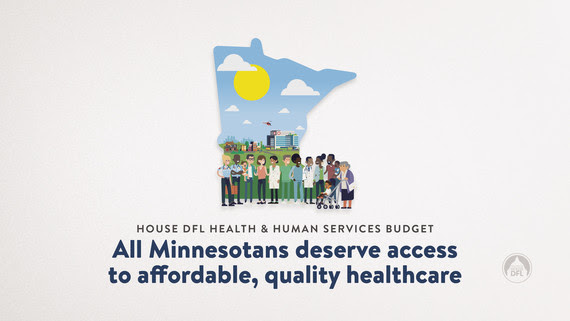
Below are more details about the budget bills advanced through the Minnesota House in the past few weeks:
Labor, Industry, Workforce, and Business Development
The past year has brought extensive amounts of economic hardship to working families and small businesses. Rep. Ecklund and I have worked very hard this session to author these measures to help deliver long-lasting financial stability, recover from COVID-19 damages, and revive the vibrancy of our state through an equitable approach to distribution. We are passing unprecedented and transformative economic development solutions, and as legislators, it’s our job to step into leadership and advance legislation that will carry us back into economic security.
The bill includes critical investments and protections for Minnesotans’ economic security, like Earned Sick & Safe Time and Paid Family & Medical Leave. In addition to funding for the Department of Labor & Industry (DLI) and the Bureau of Mediation Services, the House Labor and Industry budget supports workers and families who have been devastated by COVID-19. For example, the bill includes the Safe Workplaces for Meat and Poultry Processing Workers Act in response to devastating outbreaks at JBS and other plants that employ meatpacking workers. The bill has rehire and retention protections for displaced hospitality workers post-recovery, many of whom are people of color. The bill passed on a vote of 69-64.
Housing
Having a safe and secure place to call home is critical for Minnesotans’ health, economic security, and opportunities for achievement. Stable housing is the foundation for success. Our Housing budget will produce more affordable housing in Minnesota as well as ensure Minnesotans have access to safe and stable housing. A copy of the legislation can be reviewed here. The bill includes a number provisions to:
- Fund the Minnesota Housing Finance Agency (MHFA) for specific programs;
- Establish the lead safe homes grant program;
- Create a task force on shelter resident rights and shelter provider practices;
- Deliver investments in various affordable housing related programs;
- Enact provisions related to the Minnesota Bond Allocation Act, residential rental housing/landlord and tenant law, and manufactured housing.
Education
We advanced our E-12 Education budget bill which provides ongoing funding for every child in every public school, with additional funds to help close the opportunity gap and increase the number of teachers of color. As a member of the Education Finance and Education Policy Committees, I was particularly proud of this budget, which makes heavy investments in equitable education across Minnesota.
Last Monday, we passed the Omnibus Higher Education Finance and Policy Bill, on a vote of 74-59.The legislation continues the House DFL’s commitment to students by proposing strong ongoing investments to Minnesota’s public colleges and universities. The higher education budget holds tuition flat at Minnesota State and increases funding to the State Grant Program, impacting over 75,000 students and expanding access to over 3,000 grant applicants.
Transportation
Many of our bridges across the state are at risk of deterioration, including the Third Street/Kellogg Bridge, which is near collapse. It’s our job to make sure our roads and bridges are safe and efficient. The transportation budget would make direct investments in transportation to address the long-term safety risk posed by our aging roads, bridges, and transportation infrastructure. The bill helps Minnesota grow our multimodal transportation system to help people get where they need to go no matter where they live, with investments in including pedestrian and bike infrastructure, transit investments in both the metro and greater Minnesota, road safety improvements, rail projects, and more.
Energy and Commerce
The Energy and Commerce budget bill is another comprehensive bill passed through the Minnesota House this week on a vote of 70-64. The Climate and Energy portion of the budget puts Minnesota on a path to achieve 100 percent clean energy in the electricity sector by 2040. It improves energy efficiency goals, strengthens the renewable energy preference, and updates state emissions targets to align with the latest scientific projections. The budget takes steps to ensure the transition to clean energy is just and equitable and that people and communities who are disproportionately impacted by climate change can access jobs and other benefits during this transition.
Finally, the Commerce portion of the energy budget contains several strong consumer protection provisions for Minnesotans, by establishing a Prescription Drug Affordability Board to help drive down prices, halt the rising cases of catalytic converter theft by creating a statewide catalytic converter theft prevention pilot program, and ensuring strict guardrails are in place that make it more difficult for bad actors to make a quick profit by price gouging. This budget bill takes important, proactive steps to protect Minnesota consumers from bad actors looking to take advantage of folks already enduring financial hardship during the ongoing pandemic.
Health and Human Services
Last week, we debated the Health and Human Services budget for several hours before passage. We have approved a budget focused on helping Minnesotans get through the pandemic and to thrive after this unprecedented public emergency, building a brighter future for everyone.
 |